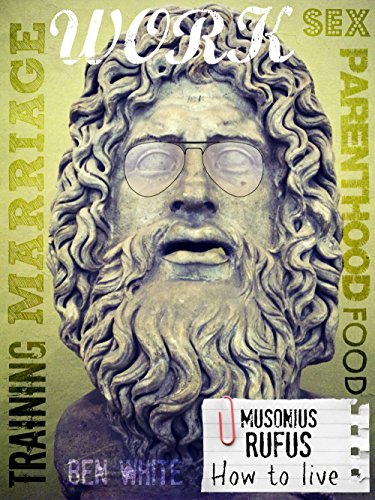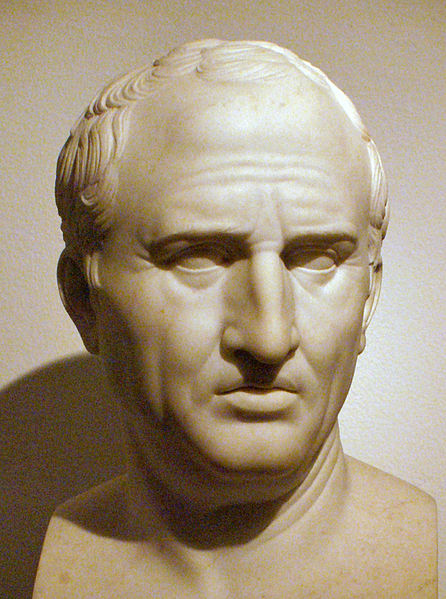
“Virtue isn’t simply theoretical knowledge-it is also practical application-just like the arts of medicine and music.”
White, Ben. Musonius Rufus on How to live.
I really like the ancient Stoics, and I particularly like the work of Marcus Aurelius and Musonius Rufus, because it’s self-evident that these men more than many others lived their work, and used their philosophy throughout their daily lives as a tool for correct living and self-improvement.
Gaius Musonius Rufus was born around about 20-30 AD and was famous in Rome by the time of Nero a renowned teacher of Stoicism and was strongly associated with the stoic opposition to Nero’s tyranny. When one of his students, the Roman nobleman and political rival to Nero Rubellius Plautus was banished from Rome, Musonius went too, returning a few years later in the wake of Plautus’s death to continue teaching Stoic philosophy.
Much of Rufus’s philosophy is shaped by his repeated periods of exile, declaring it no hardship, extolling the virtues of simple living in a place where men who once soft and accustomed to luxury, became firm and fit once again. Exile improved health and wellbeing it seems.
“Others have been in poor health from overindulgence and high living, before exile has provided strength, forcing them to live a more vigorous life. We even know of some today, cured of chronic ailments in exile-Spartiacus the Spartan, who suffered with a weak chest for a long time-when he stopped living a life of luxury, he ceased to be ill. They say that others addicted to high living have evaded gout, although previously bed-ridden by it—people whom exile forced to become used to simpler living which brought them back to health. Thus it appears that exile helps, rather than hinders body and spirit, by treating them better than they treat themselves.
White, Ben. Musonius Rufus on How to live.
Naturally enough Rufus’s prior associations made the emperor Nero very suspicious of him and three years later banished Rufus to the small Aegean island of Gyarus in the wake of the Pisonian conspiracy.
This is the same conspiracy that made Emperor Nero order his former teacher (and regular at court) Seneca the Younger to take his own life. It’s unlikely that Musonius Rufus was involved in this particular plot but it was politically useful for Nero to be rid of Musonius in the aftermath of the conspiracy; as for Seneca it’s also unlikely that he too was involved, but it’s almost certain that Nero thought he was… This was enough to seal his fate.
As Musonius lay chained, languishing in Nero’s prison, his friend Apollonius secretly asked what he could do to help release him. Musonius’ reply was a polite “thanks but no thanks”. Apollonius answered in one sentence: “Socrates the Athenian refused to be released by his friends, so went to trial and was executed.” Musonius replied “Socrates was put to death because he didn’t take the trouble to defend himself-I intend to. Farewell.”
White, Ben. Musonius Rufus on How to live.
That’s the crucial thing when it comes to philosophy, it’s not a set of dusty old ideas that you get to admire on your favourite bookshelf. Philosophy has to be lived to be worthy of any praise, it has to be practised to be useful, it has to become an aspect of the ‘self/psyche,’ to have any dignity at all. Philosophy is not just the art of living, but the art of living well. ‘Living well,’ for a stoic meant living a virtuous life, doing what was right, obeying the laws of the land, and encouraging others to be virtuous by word and deed.
Musonius obeyed all of the rules of the state, had a chance to escape but like Socrates, he remained in place to face the music. To do otherwise would have been unvirtuous, un-stoic leaving him wide open to charges of cowardice and criminality, whilst others would naturally think that Nero had ‘just cause,’ in imprisoning him.
“I have been deprived of my country, not my ability to endure exile.”
White, Ben. Musonius Rufus on How to live
Musonius Rufus is in many ways a man out of time, a modern man living in ancient times, or more correctly an enlightenment man living in ancient times defining not only which is ‘good,’ but also that philosophers should not sue anyone for personal injury, which is something that resonates a lot with me, given that daytime TV is full of one advert after another from one firm of ambulance chasers hoping to profit from the misery of others. I’ve never approved of this type of thing and am gladdened that I and Musonius are on the same page so to speak. An accident is just an accident, an expected event that had some undesired consequences for you, or put succinctly “the niceties of life,” Musonius like Crates of Thebes would say that if you can talk of the injury then ‘nothing terrible has befallen you.’
“To accept injury without a spirit of savage resentment-to show ourselves merciful toward those who wrong us-being a source of good hope to them-is characteristic of a benevolent and civilized way of life.”
White, Ben. Musonius Rufus on How to live.
He also extolled how to be resilient in hard times, demonstrating that if approached properly hardship benefits the soul and can refresh the body.
“How much more appropriate it is that we stand firm and endure, when we know that we’re suffering for a good purpose-to help our friends, benefit our city, defend our wives and children, or, best and most imperative, to become good and just and self-controlled- a state which no one achieves without hardship.”
White, Ben. Musonius Rufus on How to live
Musonius is also notable for advocating for equality of the sexes in the sense that both men and women whilst having different roles in the ancient world should both be educated in philosophy because both men and women had equal access to the rational faculty.
Kings and leaders more than any other people should study philosophy, that self-respect, self-restraint and the study of our own impulses was crucial to the good life.
“You will earn the respect of all if you begin by earning the respect of yourself. Don’t expect to encourage good deeds in people conscious of your own misdeeds. How can we condemn tyrants, when we are much worse-we have the same impulses as theirs, but lack the opportunity to indulge them.”
White, Ben. Musonius Rufus on How to live.
Musonius was a fan of the simple life, claiming that the best work was to till the land, grow your own food and be self-reliant as a result and that the best foods were the simplest foods, closest to nature. That luxury made men soft whilst comforts damaged health in addition to stating that marriage worked best when both partners were dedicated to the other and that blind obedience to higher authorities such as one’s parents and the state was unwise, to say the least, and that true wealth couldn’t be measured in coins, possessions, fine clothes and grand homes.
“To help many people is much more commendable than living a life of luxury. How much nobler to spend it on people than sticks and stones.”
White, Ben. Musonius Rufus on How to live.
As far as history knows Musionius never committed any work to parchment, this was common practice for lots of philosophers and their associated schools back in the day as paper/parchment was hard to come by, very few people could write and even fewer could read, hence the reliance on an oral tradition.
Thankfully many of Musionius teachings were scribbled down by his eager followers now compiled into a book ‘How to live,’ translated by Ben White. It truly is an excellent read and highly recommended. It’s light, easy going and joyfully obvious to understand and truly is a work of ‘philosophy for everyone.’
Like Nietzsche, Musionius could say in a single sentence what other authors took entire books to write.
“If you do a good thing through your hard work, the work passes-the good remains: if you gain pleasure through dishonour, the pleasure will pass, but the dishonor remains.”
White, Ben. Musonius Rufus on How to live.
Musonius Rufus lived through the madness of Nero’s Rome, he protested against the violence of the gladiatorial games, preached peace to the armies of Vespasian, suffered repeated bouts of hard exile in barren lands and the derision of his peers, sought out justice for those that had been wronged and became teacher to the sweet-natured and beautiful soul that we all know and love as Epictetus.
Just like Marcus Aurelius, Musonius Rufus lived his philosophy and was and still is a remarkable man as a result. His legacy and indeed his spirit lives on.

